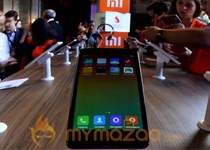There's been increasing speculation about whether Chinese smartphone giant Xiaomi has any real intention of entering the U.S. smartphone market. As time goes on, it seems increasingly likely that the company known as the Apple of China is looking to make a go of the market stateside.
Hugo Barra, Xiaomi's vice president of global operations, has up to now failed to offer any concrete assurances as to whether his company will enter the U.S. market, though several comments of late suggest it's looking more seriously than ever at the idea.
In a recent interview with Bloomberg, for example, the executive said that if it does launch in the U.S. it'll need at least a year to prep such a move, explaining that it'd take "a sizable U team….to manage the whole process operationally -- certification, ongoing engineering help, and so on."
Asked if he had any fears about launching the business in a country where legal disputes over tech-related patents have been rife in recent years -- disputes that have cost companies like Apple and Samsung enormous sums of money to contest -- Barra said the Beijing-based company was "always worried about patent licensing, intellectual property, and so on."
To strengthen its business for international markets, the former Google executive said the company is building a "war chest" of patents "for defensive purposes, because you kind of have to do that….we've filed over 2,000 patents, which is actually a lot, and we're acquiring patents [too]."
Five-year-old Xiaomi, which is currently battling it out with Apple in China for the smartphone market's top spot, has already expanded its phone business to countries such as Brazil, India, and the Philippines. Meanwhile, a tentative entry into the U.S. market has come via the launch in June of an online store selling a range of Xiaomi accessories, including its affordable $15 Mi Band and the $80 Mi Headphones.
Xiaomi didn't achieve the success it has in China without some serious strategic planning, an approach it's clearly not intending to alter as it edges toward a possible U.S. launch, though according to Barra, such a move is still at least 12 months away.







